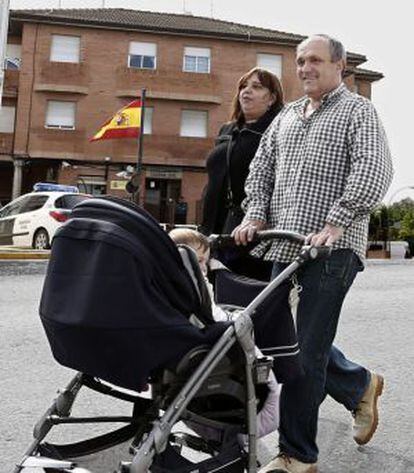Repentant ETA activist apologizes to officers injured in 1995 attack
"I am sorry for the harm I caused," writes convicted bomber Valentín Lasarte


Valentín Lasarte was once a member of the armed Basque separatist group ETA. But his decision to turn his back on violence while serving a prison sentence for his crimes made him eligible for early release. In May of this year he was granted his first three-day furlough by the High Court. One of the conditions of this release was that he sign in every day at the Civil Guard barracks in his home town of Lodosa, in Navarre.
But many of the officers assigned to the barracks today were on duty when, on August 4, 1995 Lasarte planted a bomb at the Arnedo barracks in neighboring La Rioja, which left 40 people injured when it exploded. When he realized that he was coming face to face with some of his victims, Lasarte wrote a letter to the officers at Lodosa apologizing for what he did and asking forgiveness for his actions. The letter, written in early June and addressed to the sergeant at the Lodosa station house, thanks the Civil Guard for the way they behaved during his furlough.
He also added that he had read in the media that some of the officers serving at Lasarte were on duty in Arnedo at the time of the attack, a fact that Lasarte, who was also sentenced for the murders of politicians Gregorio Ordóñez and Fernando Múgica, says that he was unaware of.
"I suppose that my having to sign in every day was not going to be a pleasant experience for you, and this circumstance will deepen this feeling," wrote Lasarte, who claims that he was given no alternative to signing in at the station house in Lodosa.
When he realized that he was coming face to face with his victims, Lasarte wrote a letter apologizing
"It is publicly known that I have recognized the harm I caused my victims and I have apologized and asked for forgiveness for this," Lasarte wrote. "When I said my victims, I was referring to all of them. Therefore, I include these already mentioned officers. If you agree, and you think it correct and possible, I would like you to transmit on my behalf to these officers that I am sorry for the harm that I caused them and their families." Lasarte closes the letter by saying that he is prepared to spend his next furlough somewhere else.
Lasarte is currently awaiting permission for a second furlough. At the end of May the High Court judge responsible for Lasarte's case granted him a six-day stay outside jail based on his good behavior during his first furlough, but the State Prosecutor's office has appealed it, accusing him of breaking the conditions of his temporary release by "spending his three days in a place close to many of his victims." The only condition laid down by the courts is that Lasarte spend his stay outside the Basque Country. ETA has traditionally claimed Navarre as part of the Basque Homeland it has fought to establish. Lasarte has since offered to spend his furlough wherever the courts decide so as not to upset the families of his victims.
The State Prosecutor's office has yet to comment on the offer. If it once again attempts to block Lasarte's furlough, it will be up to the five magistrates who granted his first temporary leave to decide. Lasarte is now part of an early release program, entitling him to spend a maximum of 36 days a year outside jail. He is being held in Zabaall prison, in Álava, along with around a dozen other former ETA activists who have turned their back on violence and recognized the harm they caused to their victims and their families.










































